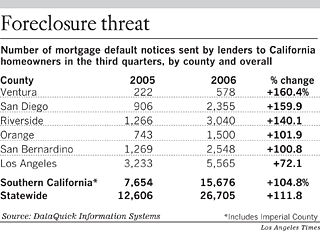L.A. Times: More Homeowners Going into Default - "We have a lot of people who got mortgages when they really shouldn't have qualified"
Los Angeles Times bubblewatchers David Streitfeld and Martin Zimmerman continue to report on rising mortgage default rates in California. For California as a whole, notices of mortgage default are 26,705, up about 111.8% in Q3 YOY from 2005, according to DataQuick. Here in Los Angeles County, the number of notices are at 5,565 in Q3, up 72.1% YOY from 2005. In fact, L.A. County is the only county in the six county region of Southern California where the percentage increase was not in triple digits.
The last time we reported on notices of mortgage default, the L.A. Times said that relatively few homes actually end up in foreclosure, because homeowners can sell before the bank can seize the property. The attitude that prevailed when that was reported was that homeowners in trouble can sell their way out of trouble into a booming market. But in today's story, DataQuick reports that 19% of the owners who went into default earlier in the year actually lost their homes to foreclosure in Q3, triple the 6% rate in 2005. Furthermore, more than half the loans that went into default in Q3 were made in 2005. So selling their way out of trouble is not an option at this time. Homeowners in default were a median five months behind on payments, and median delinquent debt was $9,829 on a $306,000 mortgage.
TerraCotta Group in Manhattan Beach is doing a booming business helping homeowners stay out of foreclosure. Well over two years ago, typically two or three people a day would come through the door. Now it's more like 30 to 40 a day. Credit counselors, too, are feeling the increased workload from the fallout of adjust rate loan resets.
The defaults are falling particularly hard on the entry level market in Southern California, where homeowners typically do not have reserves to fall back on in case of a financial crisis.
Of course the story continues to cling to hope, which is starting to be a nasty four-letter word. Experts think that defaults and actual foreclosures will continue to grow, but almost nobody is talking about a housing market collapse, even though they readily admit that foreclosures put downward pressure on prices. "Collapse" is the forbidden C- word. One DataQuick analyst says, "I don't think it's time to panic...this is a natural turning of the business cycle." Another one says, "I'm not convinced the numbers are going to continue going up at this rate, unless something major happens to the economy." Hope abounds in that tired old argument about how diversified the state economy is and how much stronger it is. Then the story goes on to say that there has not been a repeat of the 1980's building boom, which created an oversupply of homes.
Huh? Supply is fueled in part by demand, and when that demand gets up and walks away, as it appears to be doing in some places, then you can have an oversupply literally overnight.












3 Comments:
I will try to get the September median price charts up on Friday night.
Bearmaster,
As always I thank you for the data.
But I have to say, I've almost become bored with housing bubble information. Its really the same every month:
1. Not much change in the inventory
2. Sales rates are dropping
3. Experts predict a leveling to a small price drop
And I just sit back and yawn... knowing I won't buy for a long time. Knowing way too many people in mortgage trouble...
Oh, I still read. But until the "dam breaks," not much news will happen. Zzzzzz But I keep reading waiting for the "dam break."
When? Latest will be 2Q 2007. Earlier? Maybe. I've honestly given up trying to predict when prices will notably drop. I do enjoy reading the charts. I wonder if it will just be a gradual fade a la 1991/1992 for a while?
With today's loans at some point it becomes quick. The same type of people who get a zero down Option ARM are the same type who will walk away (wthout knowing about the consequences of doing that...).
Neil
I know people who have been waiting for a catastrophic economy for the better part of a decade and some even longer. It is from them that I have learned what it means to look ahead, be prepared, and to be patient. I know, it is like watching grass grow or paint dry.
Analysts are on record saying there are huge air pockets in both the housing market and stock market. The thinking is once the markets break they will break violently. And others are saying that market meltdowns are not required for a major lockdown on the financial system - all it would take would be five or six Amaranth-style hedge funds to blow up in quick succession.
Was 1991/1992 a coast down ala soft landing? It probably didn't seem like it at the time, at least if you had to endure losses because of it. Perhaps what lies ahead will make the early 90's seem like a soft landing in comparison.
Post a Comment
<< Home